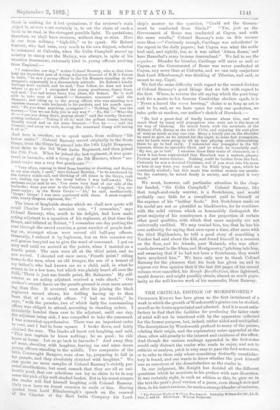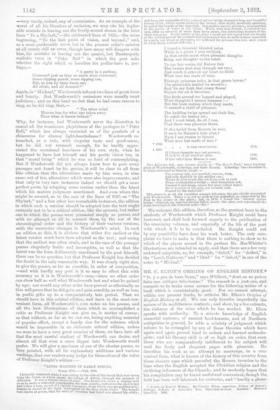THE CRITICAL EDITION OF WORDSWORTH.* PROFESSOR KNIG1IT has here given
us the first instalment of a work in which the growth of Wordsworth's genius can be studied, as well as its fruits appreciated and admired. And it is most satis- factory to find that the facilities for producing the latter state of mind will not be interfered with by the apparatus collected for the former purpose, but, indeed, rather aided and multiplied. The descriptions by Wordsworth prefixed to many of the poems, relating their origin, and the explanatory notes appended at the close, often add greatly to the interest and vividness of the effect. And though the various readings appended in the foot-notes would only distract the reader who reads to enjoy, and not to criticise or analyse, yet it is very easy to pass the foot-notes over, or to refer to them only where something distinctly unsatisfac- tory is found, and one wants to know whether the poet himself' was as conscious of the dissatisfaction as the reader is. In our judgment, Mr. Knight has decided all the different questions which he mentions in his preface with rare discretion. It was certainly right, in such an edition as this, to give us in the text the poet's final version of a poem, even though now anct then, in his latest versions, he made a strange blunder of omission,
Tho Poetical Works of a Ohm. li"ordswMtb. Edited by William Kn'ght, LL.D.. Vols. I. and IL likilnburgh : William Patterson.
--very rarely, indeed, any of commission. As an example of the worst of all his blunders of omission, we may cite his deplor- able mistake in leaving out the lovely second stanza in the later lines " To a Skylark,"—the celebrated lines of 1825,—the verse beginning, ," To the last point of vision, and beyond ;" and, as a more pardonable error, but in the present critic's opinion at all events still an error, though here many will disagree with him, his mistake in leaving out the quaint, but Dautosquely realistic verse in "Peter Bell" in which the poet asks whether the sight which so horrifies his pedlar-hero is, per- haps,—
" A party in a parlour,
Crammed just as they on earth were crammed, Some sipping punch, some sipping tea,
But, as you by their faces see,
All silent, and all damned ?"
Again, in" Michael," Wordsworth left out two lines of great force and beauty. But Wordsworth's omissions were usually most judicious ; and on this head we feel that he had some reason to sing, as he did sing, that,—
" The wiser mind
Mourns loss for what age takes away,
Than what it leaves behind."
Why, for instance, had Wordsworth never the discretion to cancel all the wearisome playfulness of the prologue to "Peter Bell," which has always reminded us of the gambols of a
rhinoceros for clumsy light-heartedness Wordsworth re- trenched, as a rule, with singular taste and good-sense;
but he did not retrench enough, for he hardly appre- ciated the occasional heaviness of his own style, when he happened. to have lost himself and his poetic vision too, in that "moral being" which he was so fond of contemplating.
But if Wordsworth did not always know how to pare away passages not fused by his genius, it will be clear to all from this edition that the alterations made by him were, in nine cases out of ten, alterations which were also improvements, and that only in very rare instances indeed we should get a more perfect poem, by adopting some version earlier than the latest which his mature judgment sanctioned. And oven where this might be secured, as in the case of the lines of 1825 on " The Skylark," and a few other less remarkable instances, the edition in which such a version should be adopted into the text ought certainly not to be a critical edition, like the present, but rather one in which the poems were presented simply as poems, and with no attempt at all to connect them, by the use of the chronological order and the history of their various versions, with the successive changes in Wordsworth's mind. In such an edition as this, it is obvious that either the earliest or the latest version must have been adopted as the text ; and seeing that the earliest was often crude, and in the case of the younger poems singularly feeble and incomplete, as well as that the latest was the form deliberately sanctioned by the poet himself, there can be no question but that Professor Knight has decided the doubt in the only reasonable way. It was clearly right also, to give the poems, as far as possible, in order of composition, —and with hardly any poet is it so easy to effect this with accuracy as it is in Wordsworth's case,—since no other order can show half as well what Wordsworth lost and what he gained by age; nor would any other order have proved as effectually as this will prove that he did gain, and gain sensibly, as well as lose, in poetic gifts up to a comparatively late period. That we should have in this critical edition, and have in the most con- venient form, all Wordsworth's own notes on his poems, and all the best illustrations of them which so accomplished a critic as Professor Knight can give us, is matter of course ;
so that without, as far as we. can see, losing anything material of popular effect, except a handy size for the volumes which would be impossible in an elaborate critical edition, unless we were to have a very great number of them, we have here all that the most careful student of Wordsworth can desire, and almost all that even a mere dipper into Wordsworth would prefer. We will give a specimen of one of the shorter poems, as here printed, with all its explanatory additions and various
readings, that our readers may judge for themselves of the value of Professor Knight's .
"LINES WRITTEN IN EARLY SPRING. Comp. 1793.—Pub. 1798.
[Actually composed while I was sitting by the side of the brook that runs down from the Comb, in which stands the village of Alford, through the grounds of Alfoxden. It was a chosen resort of mine. The brook ran down a sloping rook so as to make a waterfall considerable for that county, and morose the pool below had fallen a tree, an ash if I rightly remember, from which rose perpendicularly, boughs in search of the light intercepted by the deep shade above. The boughs bore loaves of green, that for want of sunshine had faded into almost lily-white ; and from the uuderaide of this natural sylvan bridge depended long and beautiful tresses of ivy, which waved gently in the breeze, that alight, poetteally speaking, be called the breath of the waterfall. This motion varied, of course, in proportion to the power of water in the brook. When, with dear friends, I revisited this spot, after an interval of more than forty years, this interesting feature of the scene was gone. To the owner of the place I oould not but regret that the beauty of this retired part of the grounds had not tempted him to make it more accessible by a path, not broad or obtrusive, but suffloient for persons who love such scenes to creep along without difticultY•J
I heard a thousand blended notes While in a grove I sate reclined, In that sweet mood when pleasant thoughts Bring sad thoughts to the mind.
To her fair works did Nature link The human soul that through me ran ; And much it grieved my heart to think What man has made of man.
Through primrose tufts, in that green bower,*
The periwinkle trailed its wreaths ; And 'tis my faith that every flower Enjoys the air it breathes.
Tho birds around me hopped and played, Their thoughts I cannot measure :— But the least motion which they made, it seemed a thrill of pleasure.
The budding twigs spread out their fan, To catch the breezy air ;
And I must think, do all I can, That there was pleasure there.
If this belief from Heaven be sent, If such be Nature's holy plan,f Have I not reason to lament What man has made of man ?
* ldaS.
• in that sweet bower. 1708.
t 1827. If I those thoughts may not prevent, If such be of my creed the plan, 1798.
If this belief from Heaven is sent. 1820.
This Alfoxilen dell, once known locally its' The Mare's Pool,' was a trysting- plane of Wordsworth, Coleridge, and their friends. Coleridge Elms describes it, in Lines addressed to Charles Lamb :- The roaring doll, o'er-wooded, narrow, deep,
And only speckled by the midday sun ;
Where its slim trunk the ash from rook to rook Flings arching-like a bridge ;—that branchless ash, Unsuun'd and damp, whose few poor yellow leaves
Ne'or tremble in the gale, yet tremble still,
Fanned by the waterfall This grove is, of all the localities around Alfoxdon, the one chiefly associated
with Wordsworth. There is as yet no path to the waterfall, as suggested by the
Poet to the owner of the place ; but, in 1830, I found the natural sylvan
bridge' rooters& an ash-tree having fallen across the glen, and reproduced the
scone described its the Fenwick note.—En."
We welcome this edition, therefore, as the greatest boon to the students of Wordsworth which Professor Knight could have bestowed, and shall look forward eagerly to the publication of the remaining volumes, and especially of the life of the poet with which it is to be concluded. Mr. Knight could not by any possibility have done his work better. The only com- plaint we have to make is that there is nothing to show us to which of the places named in the preface Mr. MacWhirter's illustrations arc intended to apply, and that there are a few very awkward misprints, as, for example, "defied," for "deified," in the "Leech-Gatherer," and " liked " for " linked," in one of the • notes to " Michael."































 Previous page
Previous page